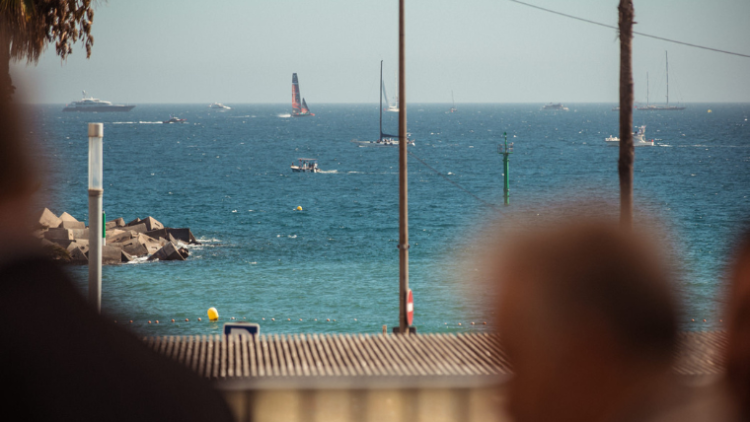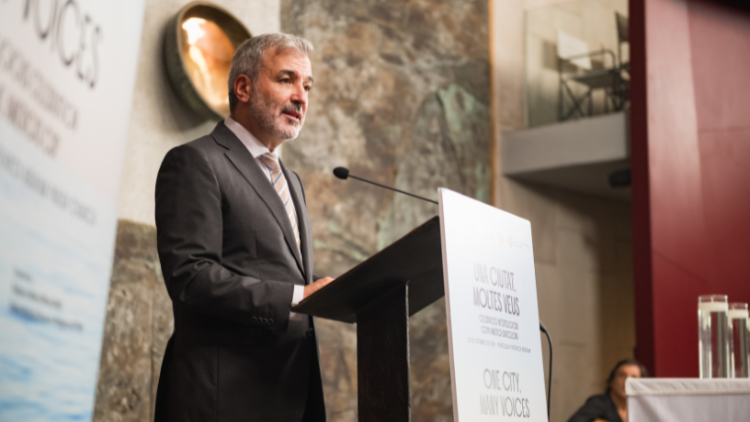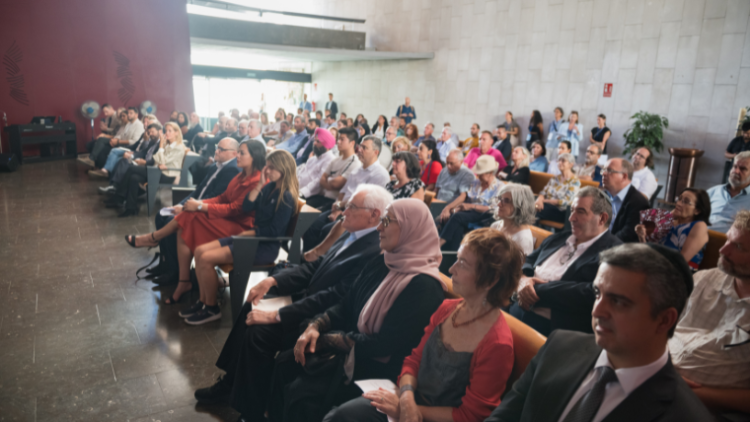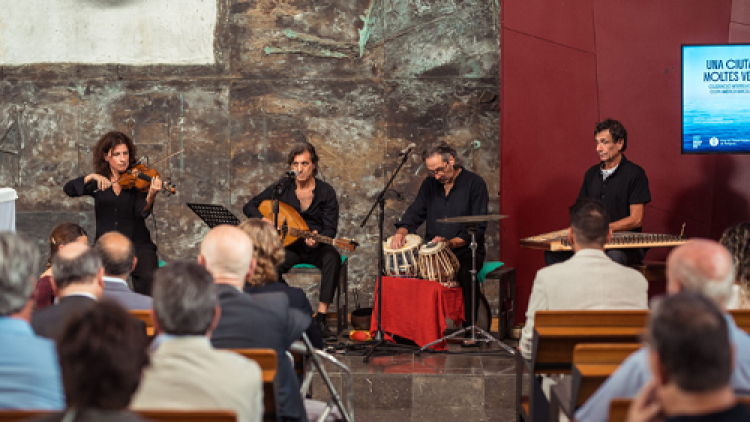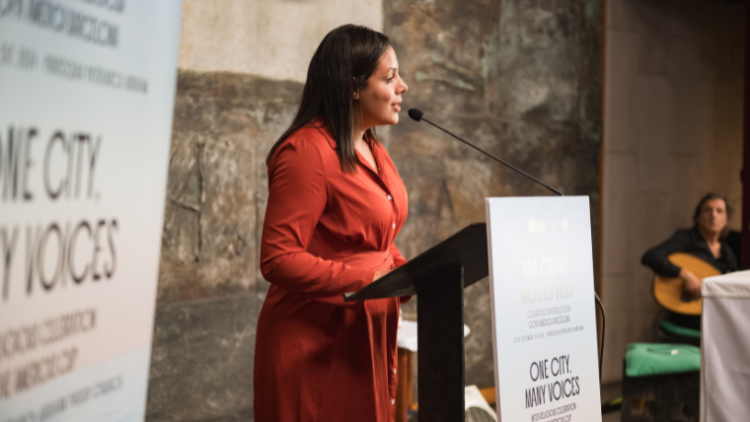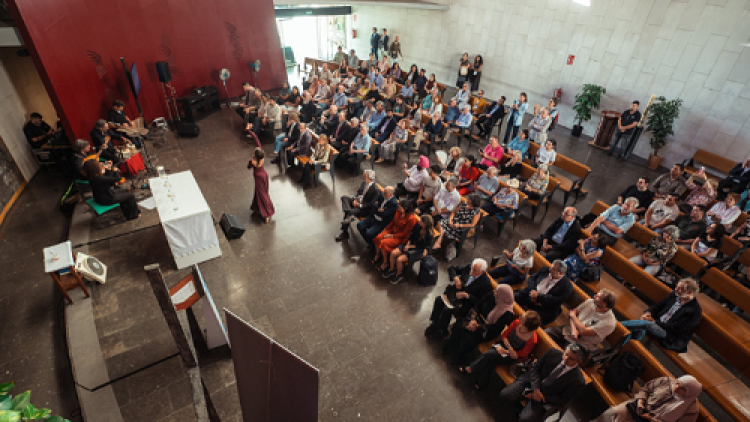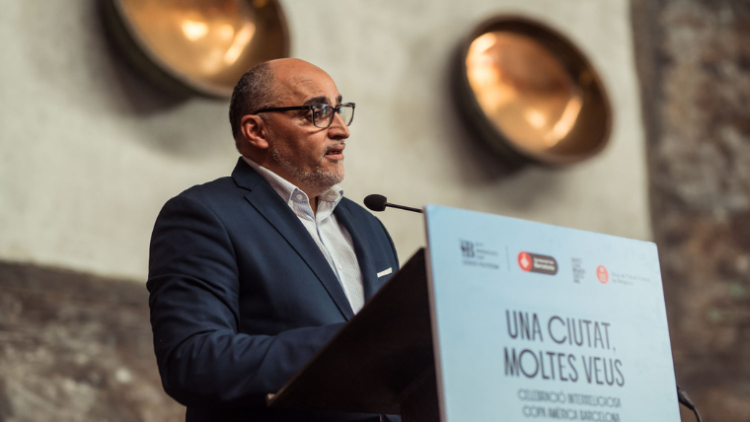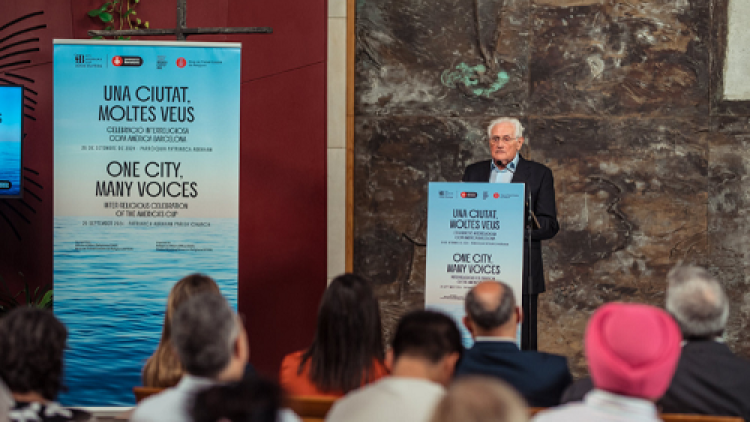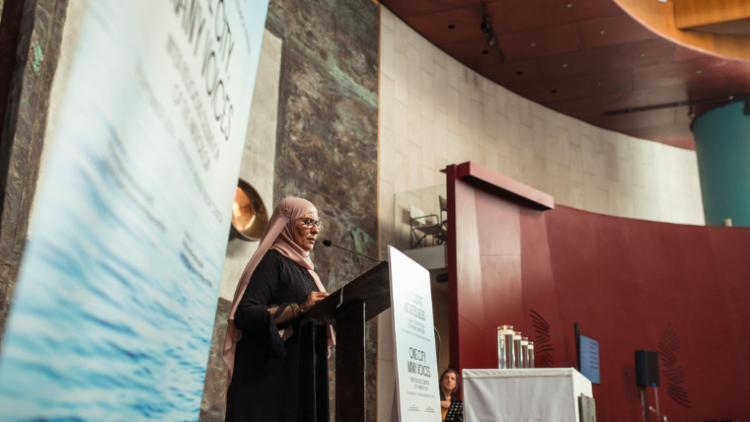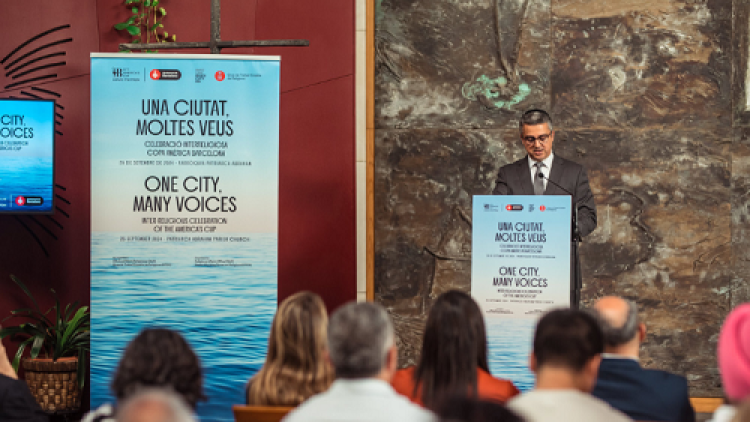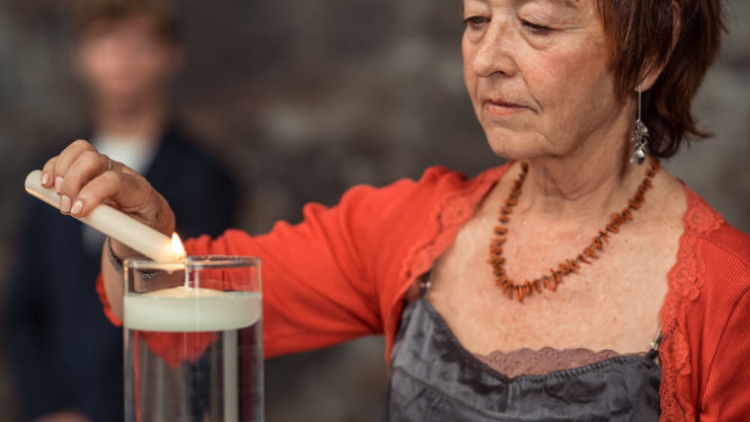"Interfaith meeting spaces are more necessary than ever for fostering what unites us in diversity", Jaume Collboni
On 26 September, Barcelona hosted an interfaith meeting entitled “One city, many voices”, within the framework of the 37th America's Cup, with the aim of recognising and raising the visibility of the plural, rich and diverse city that Barcelona is, a city that is welcoming and open. The meeting, organised by the Religious Affairs Office and the Permanent Working Group for Religions, consisted of an interfaith event at the Patriarca Abraham Centre and, beforehand, attendees were able to follow the final of the competition from the Biomedical Research Park in Barcelona. It was attended by around 120 people representing some twenty religious and spiritual communities and organisations from the city and the teams participating in the America's Cup.
Attending this event were the mayor of Barcelona, Jaume Collboni; the commissioner for Citizen Relations and Cultural and Religious Diversity, Sara Belbeida; the deputy mayors M. Eugènia Gay and Albert Batlle; the councillor for Sport, David Escudé, and councillor Neus Munté, among other representatives and authorities.
After hosting the Olympic Games in 1992, the America’s Cup is the second international event of this magnitude to be held in the city of Barcelona. It was within the framework of an international event of this size and as part of the Cultural Regatta, that the event “One city. Many voices. Inter-religious celebration of the America’s Cup” was organised. It was held in the interfaith venue built for the 1992 Olympic Games, the Patriarca Abraham Centre, linking the city’s past and present, and building a bridge between two crucial points in Barcelona’s international outreach.
A venue with a markedly symbolic character, “both from a religious and a historical point of view, in relation to the Olympic Games of 1992”, recalled mayor, Jaume Collboni. And it is no coincidence that the interfaith gathering, promoted by Barcelona City Council, was held at the Patriarca Abraham Centre. During his speech, the mayor recalled that the Abraham Centre was built for the 1992 Olympic Games in order to host the Olympic Village’s religious services for followers of the five faiths recognised by the International Olympic Committee (Catholicism, Protestantism, Islam, Buddhism and Judaism). “The Abraham Centre became one of the main interfaith experiences to have taken place in the city of Barcelona. This centre is a work of art at the service of ecumenism”. “And today, we relive the interfaith experience of ‘92”, affirmed Collboni, whilst claiming that a union based on transcendence “goes beyond concrete beliefs”. And he went on to say: “32 years after this venue was first opened, we are back to experience a sporting event that brings together teams from various countries around the world”, and he added: “Interfaith meeting spaces are more necessary than ever for fostering what unites us in diversity”. Today, Barcelona is a city that seeks to promote interfaith dialogue. A dialogue that is an essential tool for building a world at peace. “We need spaces where we can imagine and build this peace. And Barcelona wants to contribute to this, as we have always done, with the collaboration of everyone”, said the mayor.
A set of beliefs, highlighted the president of the Permanent Working Group for Religions (GTER), Mohamed Halhoul, that mean religious communities make “a real and positive contribution in areas like justice and coexistence”. It is part of the daily life of the city that “religious and spiritual communities, like so many others, bring great patrimonial and cultural wealth and make Barcelona a welcoming, cosmopolitan city and an international benchmark”, remarked Halhoul. And, addressing the theme of the meeting, he pointed out that one of the aims of this event is to recognise the contributions communities have made towards social justice.
The commissioner for Citizen Relations and Cultural and Religious Diversity, Sara Belbeida also underscored this daily work in her final speech. At this event, “we have managed to achieve something very special: coming together, despite our differences, to reflect and share a moment of peace and coexistence. Without ceremonies or liturgies, but with music and reflection as the connecting threads, we have shared a communal space for learning”. She added: “but above all I would particularly like to thank the religious and spiritual communities in our city for the work you do every day, day in, day out. You contribute with your solidarity, your commitment and your values to make this city a better place for all citizens of Barcelona. Without you, Barcelona would not be Barcelona”. There are many communities and entities from Barcelona that undertake remarkable social initiatives that sometimes go unnoticed: The Bahá’í Centre of Barcelona, Dahira Jazul Khoulob, Minhaj ul’Quran, Centre Cultural Islàmic de Sants, among many, many more. They are communities of people who, regardless of their beliefs or their origins, help to make Barcelona a city that is even more human and supportive. They need to be given the recognition and prominence they deserve.
The interfaith meeting, which was held on the evening of 26 September, devised by the GTER, was based around reflection and music, without liturgy and designed to be a common space where people from different religious communities in the city could reflect on texts from various religious traditions that inspired them, related to creation, water and the sea as symbolic elements. Water, the sea, is a fundamental element in maritime sports, as are the wind and other creation elements. In this context, the America’s Cup is one of the oldest and most prestigious sailing competitions, and it has a special relationship with water. Religion, for its part, has maintained a symbolic relationship with the seas and oceans. Water symbolically represents a diverse range of elements such as purification, rebirth or life force, and is often the setting of great mythological and religious acts. The America’s Cup could be seen as a metaphor of the human condition, finding its way through the immensity of the ocean. This competition is a reminder of the deep connection humans have with water, a connection that goes back to the beginning of time and which is manifested in various ways, both in sport and in faith practices. It is through this connection that, at this interfaith meeting, participants were reminded of the close, singular and symbolic relationship that each tradition has with water and creation.
At the event, sacred texts and personal reflections were read out by Dr. Antoni Matabosch (Christianity), presbyter of Barcelona, doctor of Theology and member of the GTER; Ms Aicha Mahamsani Ettibari (Islam), of the Consell Islàmic Cultural de Catalunya association; Mr. Samuel Garzón (Judaism), Rabbi from the Comunitat Israelita de Barcelona, and Ms. Glòria Puig (Buddhism), president of the Coordinadora Catalana d’Entitats Budistes and secretary of Sakyadhita Spain. After each of the talks, a candle was placed on the water as a symbolic gesture. A number of pieces of music were performed at the event by Burruezo & Nur Camerata: ‘Nur-llum’, ‘Aman aman’, ‘Ebrios de amor divino’, ‘Komako’, ‘Noi ti preghiamo’ and ‘Qurtuba’.
The Religious Affairs Office (OAR) co-organised the event along with the Permanent Working Group for Religions (GTER). The OAR is a municipal service that seeks to guarantee the right to freedom of religion and conscience in the city, facilitates knowledge and recognition of the religious plurality found in the city and creates spaces for dialogue and positive interaction. Religious pluralism has been integrated into intercultural policies through the Barcelona Interculturality Plan (2021-2030), which in addition to its commitment to moving towards real and effective equal rights, also includes recognition and respect for cultural diversity and religious plurality as a structural aspect of society which needs to be present and valued, and the aim of facilitating positive interaction, generating links, participation and intercultural dialogue under equal conditions. The GTER is an interfaith network that promotes peace and harmony between different religions, a reference point for practical dialogue and collaborative work between faiths. Its aim is to educate people to combat prejudice and stereotypes and it seeks to eradicate discrimination and ignorance. It also proposes joint work to ensure different faiths become integrated into society in a harmonious and normalised way. The meeting also sought to recognise the interfaith dialogue initiatives that take place in Barcelona and to promote greater mutual understanding between different communities.

